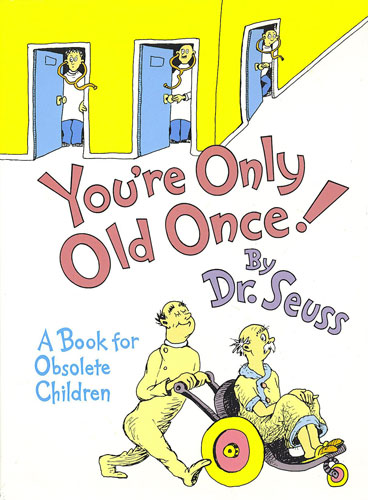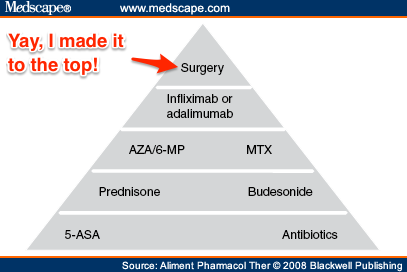According to the Crohn's and Colitis Foundation of America, there are 1.6 million Americans with IBD (Inflammatory Bowel Disease). While that means less than 1% of Americans have either Crohn's or Colitis, that's a pretty big number—and chances are you know someone with IBD, maybe even a close relative!
But due to the fact that Crohn's is usually an invisible illness, many people don't know some of the myriad joys of a typical Crohn's patient's life. This blog post aims to clear that up.
Phobias
Most people I know have one or more of the following phobias:
- Fear of swallowing large pills (pharmacophobia or phagophobia)
- Fear of needles and/or subcutaneous injections (needle phobia)
- Fear of ionizing radiation (radiophobia)
- Fear of germs (mysophobia)
- Fear of confined spaces (claustrophobia)
If you're a Crohn's patient, and have any or all of these phobias, you're in luck! Through the course of diagnostics and treatments, you will be forced to overcome all of them:
- You'll regularly swallow horse-suppository-sized pills multiple times a day
- You'll self-inject numerous drugs (or have them injected via IV)
- You'll receive multiple doses of ionizing radiation and/or other forms of radiation (CT especially, but also X-ray and MR imaging)
- You'll take drugs that effectively shut down your immune system (so maybe the fear of germs won't ever really be overcome...)
- You'll squeeze into tight spaces regularly, like when you have to get your biannual MR enterography. Bonus points for also having to receive an IV (fear of needles) before the procedure!
Often you get a twofer—like swallowing a cup full of large pills before getting an IV, which is all in preparation for a dose of ionizing radiation during a CT scan!
Diagnostics

During a barium enema, you flop around like this, with a hose in your butt.
Speaking of CT, MR, X-ray, and such, there are a number of procedures that—unless you have IBD—you might never know about, or expect to undergo until you're an old person. Like a procedure where someone sticks a hose the wrong way in your system, pumps you full of goop, makes you flop around like a walrus on an X-ray table while they take pictures, then yanks the hose while you high-tail it to a toilet while leaking said goop! (The fancy name for this is a barium enema.)
Or the procedure where you have to drink a full liter of said goop, wait an hour, then get stuck inside a small tube the width of two basketballs for an hour while a loud machine uses a 30,000 gauss magnet to slice up your body, image-wise, so you can see a glowing image of your squishy intestines. (The fancy name for this is MR enterography.)
Or the procedure where you have an IV that looks like something out of a movie, pumping said goop directly into your bloodstream (in addition to goop you just drank) while you're stuck inside a machine that spins as fast as your washing machine around your body whilst shooting ionizing radiation directly into your body. (The fancy name for this is CT enterography.)
Or the procedure where a doctor puts you to sleep then forces a long thick tube up the wrong way, taking a bunch of pictures of your insides, then even scraping little bits of said insides for further testing. (The fancy name for this is a colonoscopy.)
Honestly, by the second or third time you're run through the gauntlet of tests, you feel like the protagonist in You're Only Old Once!:

Short synopsis: an old guy gets a zillion exams done, moving from doctor to doctor in a maze-like hospital.
I almost forgot the best part! Most of the above procedures either involve fasting for a number of hours (not the end of the world...), or a full colo-rectal purge—which if you've never done one, feels like this, but coming out of your hind parts:
Medicines and Treatments
Crohn's disease is one of the family of diseases where there is no known cure. Someday, there might be one, but until that day comes, Crohn's patients are generally stuck somewhere in this 'pyramid of treatments':

You start your way at the bottom, and then climb up. Each new level brings with it an array of new and exotic side effects, as well as exponential increase in price! Also, you usually start with oral medications, then graduate your way up to self-injected medications, suppositories, enemas, and IVs. It's not that fun, to be honest, especially when you realize you're being billed more than your annual salary to sit for hours at a time being injected with a drug that's turning off your immune system (among other things)... and will likely become ineffective at some point (or never help at all—but it takes weeks or months to know!).
Now don't get me wrong—it's a blessing that there are now numerous drugs in every treatment level for Crohn's; in the past, if you developed antibodies to Remicade, you were up a creek and it was time to climp to the top of the pyramid and start cutting out parts of your intestine. Nowadays, there are a half-dozen effective TNF-blocker medicines, some better or worse, but all viable options pre-surgery.
In terms of medications for moderate to severe Crohn's, it's not a pretty picture, but it's actually improving over time. And some drugs on the horizon promise to be even easier on our systems, meaning they could help us stay in remission much longer!
Then there's Prednisone. Everyone Crohnie has a love/hate relationship with that monster drug. Best to not talk about it.
Relationships and Family
I have an amazing wife. You have to put up with a lot if you are in a dedicated relationship with someone with IBD. Besides the obvious medical exams, potential surgeries and short/long-term disability, monthly medical billing phone calls... there are myriad other lifestyle differences. Like spending hours on the porcelain throne. And laying uncomfortably in bed, on a couch, or on the floor at various times due to crippling stomach pain (usually accompanied by gassiness, which makes it all the more interesting!). And causing vacation or date plans to change (or be somewhat restricted) due to dietary, location, or even bathroom issues!
On top of that, especially for an otherwise-healthy youngish person who has Crohn's, not being able to do things like work on a certain home project, do common yard work, gardening, and maintenance, work on cars, etc. can weigh on you. I consider myself a 'provider' for my family... and when I'm not, well, providing, that makes me feel bad!
We haven't even started to talk about the impact (superficial or not) of having regular discussions about stool composure, toilet comfort, hemorrhoid care, skin tags, abscesses, fistulas, fissures, and more with those closest to you. I mean, I have kids, so I am used to talking about significant differences in poop. But it's a bit different when you're talking about your own!
And for extended family members, who are usually not as attuned to a Crohn's patient's current symptoms and condition, things can be... awkward. Being invited to certain events and not being able to make it because of toilet time, or fatigue—or any number of other reasons—can be tiring, and some people may feel like they're being slighted when it's the third time their invite is declined in a year. I don't blame them, but I do know my Crohn's symptoms impact on my family relationships.
Work Life
It's awkward enough for most people to use the restroom in the long form at their workplace. Imagine having to do so on a regular basis—sometimes multiple times per day!

I've been blessed to work remotely and in office environments where flexible work hours were allowed, but not everyone has this privilege—This is one area (besides getting Crohn's while very young) where Crohn's disease can be particularly restrictive. There are many occupations that you simply cannot pursue because of the disease. For example, I'm pretty sure the space toilets on the ISS aren't rated for IBD-level fecal escape velocity. There goes my aspiration of being an astronaut!
Mixed blessings
Obviously this post is full of tongue-in-cheek statements... there are a few things that Crohn's patients can do that most people cannot:
- Any foods you don't like? Just tell people you can't eat them—because Crohn's
- Be billed for hundreds of thousands in medical expenses, year over year (better have good insurance!)
- Listen to friends tell you how you could be cured by eating dirt or sticking other people's feces into your bowels (with friends like these, who needs enemas?)
- Never become obese1! If you eat too much, your body acts like a bilge pump and shoves it right back out!
- Quickly locate the most comfortable restroom within one minute's walk of any urban location on the planet.
Summary
What I've said here doesn't only apply to Crohn's disease or IBD; there are a range of similar autoimmune diseases and other ailments that are the cause of frequent 'joy' in people's lives. And though there are many negatives mentioned above, there are also great highlights—like working with some great doctors and nurses who want to improve other people's lives, and being able to realize how precious time in remission is (when your life is back to normal).
So go give someone with Crohn's or IBD a hug—they might just need one, even if they look like they're feeling great!
If you like this post, check out my new book about IBD and Crohn's disease: You Only Have Crohn's Once!.
1 Unless you're on a large dose of Prednisone!


Comments
Thanks for posting this, Jeffrey. Your sense of humor and positive attitude are intact, even if your immune system isn't. And it's good for family and friends to have an idea of what our "Crohnies" deal with. We're thinking about you as you conquer the top of that pyramid. <3
Many prayers coming your way, Jeff!
Well, I guess I was "lucky" in that I started with Prednisone and then when I couldn't get down to a maintenance does, went directly to surgery. Of course, this was in 1983, so the other options weren't available then (except for Flagyl, and that didn't really do anything). And a case of food poisoning in 1989 led to another flareup, which led to a second surgery. Since then I've had what you might call a very light case of Crohn's. In fact, I weigh more now than I've ever weighed.
@Glen - thanks for sharing your experience! It's always good to hear from someone who has had good experience with surgeries... as I'm going to have my first one very soon, I'm hoping for the best, and hoping I can go into/stay in remission for many years!
I'm still recovering from my resection, but WOW this is the first time in years that I've been able to use the facility in the long form where 'long' is less than 10 minutes. So this is how the rest of the world goes number two?!
So far, the surgery has been a great success. Hopefully Crohn's settles down some for me...
News flash: it was only a temporary win. Rest of the colon went full nuclear, and I had another surgery in 2018. Recovery went well, though, and I'm back on Cimzia, but things are looking up for now!
What a great blogpost! Our sympathies are with you. Loved the moving graphics, too! God bless you as you heal up.
Hey, I really enjoyed reading this. I came here from your YouTube video, "I have Crohn's Disease".
I was diagnosed last week and finding someone else who is in tech that also has Crohn's is comforting. I don't know anyone personally that has it. With regards to the topic of work - thank goodness for COVID instating WFH policies. I can't sit right now due to what I suspect are abscesses, so I lay down on my couch or stand at my desk while I work.
I feel bad for those like you who were diagnosed at a much younger age, and weren't able to experience your youth with as much freedom.
Just a couple random thoughts. Thanks for everything you do, I wish you good health.
Good luck, and feel free to reach out on Twitter or email sometime if you have a question :)
And yes, COVID and the new WFH freedom many of us have has been a huge benefit for those of us with Crohns and other illnesses that can hamper our ability to work in a central location and in often-uncomfortable office environments!
I think you wanted to say MRI but wrote MR just will point that out Jeff
In that case it was "Magnetic Resonance Imaging" or "MR imaging"